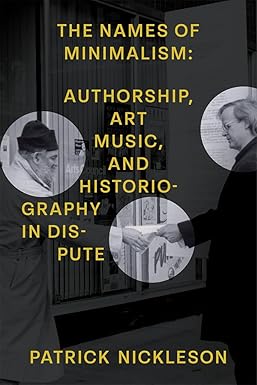by Patrick Nickleson (Author)
"The dialectical discussion is enlivened no end by entertaining anecdotes about spiky relationships between what Nickleson terms the "Big Four" composers. . . he provides a methodological toolkit that, in a different way to On Minimalism but to similar effect, seeks a poetic justice that will enrich our engagement with these musics." -- The Wire Published On: 2023-04-01
“ The Names of Minimalism contributes to the effort of producing the historiography of minimal music while introducing and exploring the specific (and crucial) topic of authorship in the field. Nickleson addresses these important questions methodically and with care.”
-- Christophe Levaux, author of We Have Always Been Minimalist: The Construction and Triumph of a Musical Style
“This book presents a total reimagining of minimalism's early history. Rather than narrating this history through musical style or composing biography, Nickleson examines minimalism's history through its politics of authorship, pedagogy, propriety, and egalitarianism. This book makes a significant contribution to scholarship on minimalism and, more broadly, has the potential to reorient any scholarly mind doing historical work."
-- Kerry O'Brien, co-editor of On Minimalism: Documenting a Musical Movement
Minimalism stands as the key representative of 1960s radicalism in art music histories—but always as a failed project. In The Names of Minimalism , Patrick Nickleson holds in collaborative tension composers in the period of their collaboration, as well as the musicological policing of authorship in the wake of their eventual disputes. Through examinations of the droning of the Theater of Eternal Music, Reich's Pendulum Music , Glass's work for multiple organs, the austere performances of punk and no wave bands, and Rhys Chatham and Glenn Branca's works for massed electric guitars, Nickleson argues for authorship as always impure, buzzing, and indistinct.
Expanding the place of Jacques Rancière's philosophy within musicology, Nickleson draws attention to disciplinary practices of guarding compositional authority against artists who set out to undermine it. The book reimagines the canonical artists and works of minimalism as “(early) minimalism,” to show that art music histories refuse to take seriously challenges to conventional authorship as a means of defending the very category “art music.” Ultimately, Nickleson asks where we end up if we imagine the early minimalist project—artists forming bands to perform their own music, rejecting the score in favor of recording, making extensive use of magnetic type as compositional and archival medium, hosting performances in lofts and art galleries rather than concert halls—not as a utopian moment within a 1960s counterculture doomed to fail, but as the beginning of a process with a long and influential afterlife.
ISBN:

